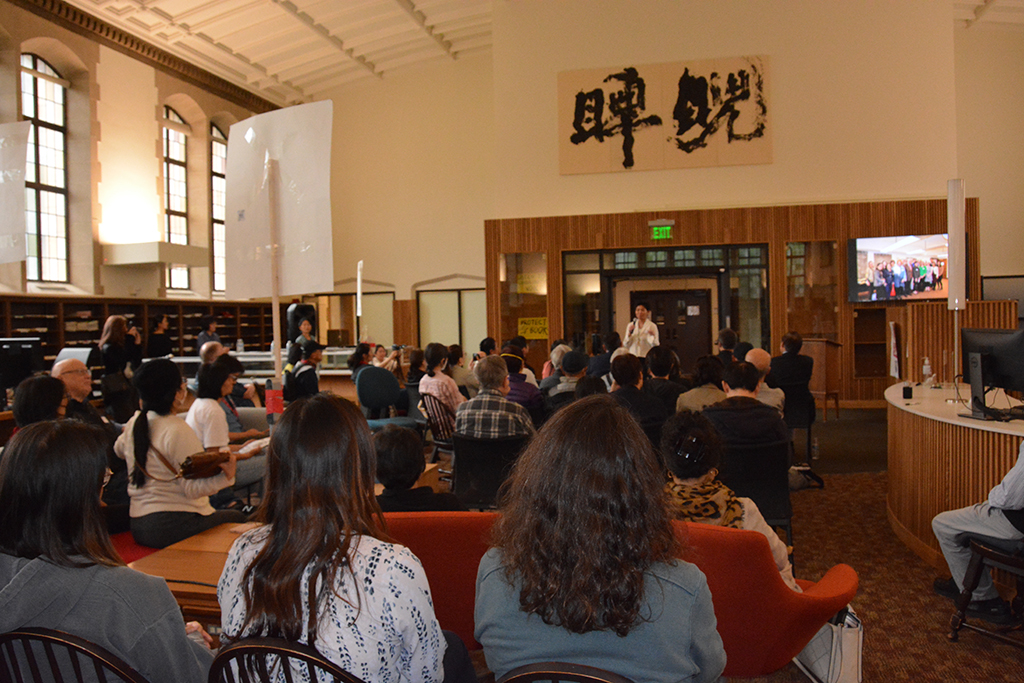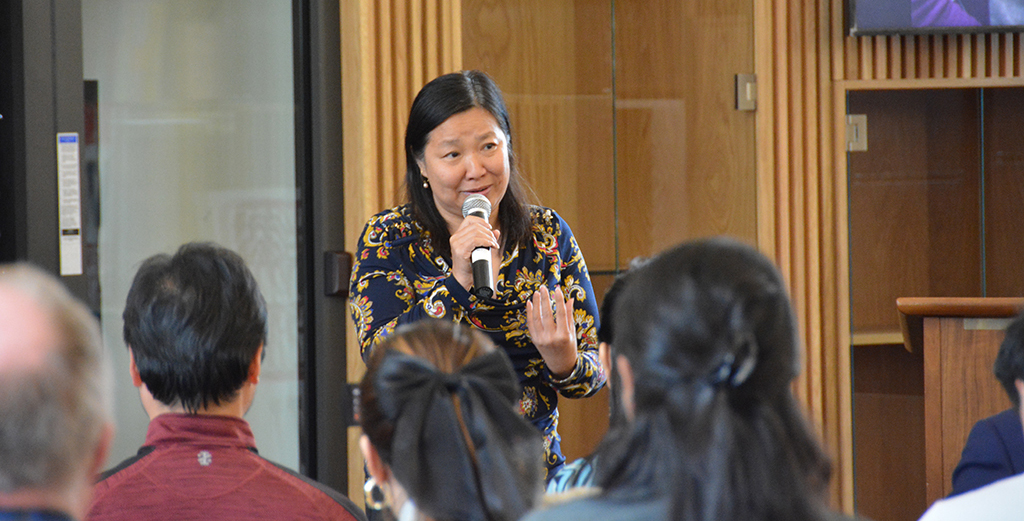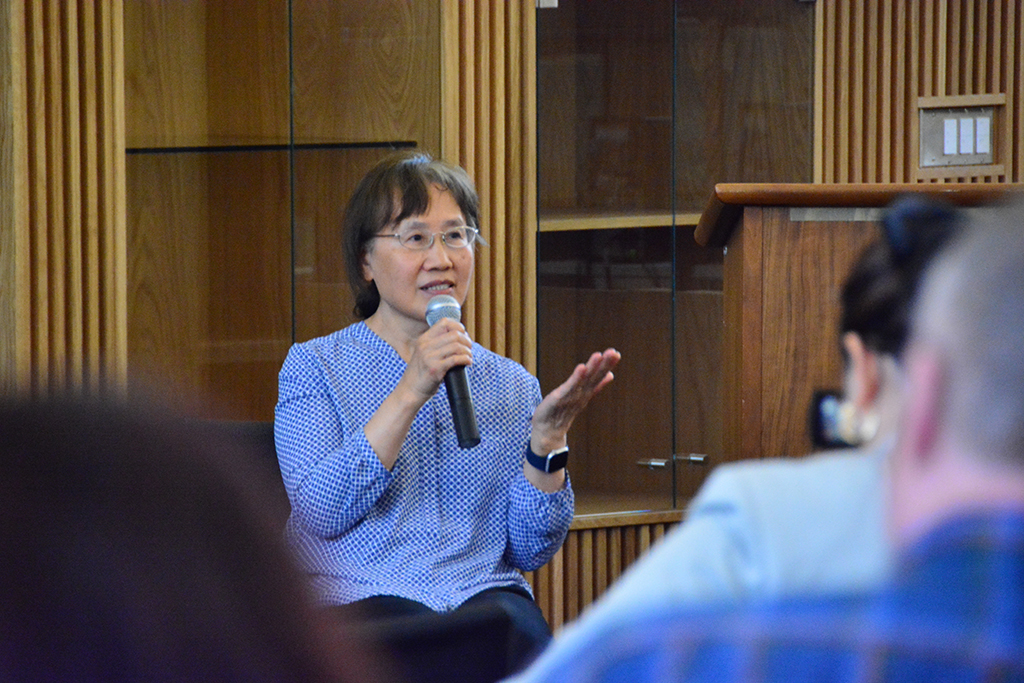By Mahlon Meyer
NORTHWEST ASIAN WEEKLY
The University of Washington (UW) will form an advisory committee to review the process by which its world-class Tateuchi East Asia Library (TEAL) was reorganized, according to several state legislators.
“It’s because the whole thing was such a faux pas,” said state Sen. Bob Hasegawa, who attended the meeting. “They need to cultivate more community participation before they make these top-down decisions.”
At a meeting with Simon Neame, dean of UW Libraries, called by state Sen. Javier Valdez, and attended by Hasegawa and state Rep. Cindy Ryu, Neame responded to some of the community concerns, said Hasegawa. But, according to several reconstructions of the meeting, Neame did not address the most devastating assessments of the changes to the library—for instance, that by moving librarians specializing in East Asian languages, cultures, and the collections themselves out of the TEAL and offsite, this would ultimately lead to the dissolution of the library itself.
A spokesperson for the UW, Victor Balta, did not respond to questions about the meeting with legislators.
But, he said, “To my knowledge, no such committee is being formed.”
 State Rep. My-Linh Thai, who was in Washington, D.C. and unable to attend, told the Northwest Asian Weekly she is reviewing notes from the meeting she received from Ryu.
State Rep. My-Linh Thai, who was in Washington, D.C. and unable to attend, told the Northwest Asian Weekly she is reviewing notes from the meeting she received from Ryu.
Ryu and Valdez did not immediately respond to queries.
Opposing statements
The meeting came after a town hall on June 9 organized by an advocacy group, Friends of Tateuchi East Asia Library, which has coalesced opposition to the abrupt reorganization. Neame has said the advocacy group and a petition contains misinformation. For instance, the petition stated that 75% of the staff at TEAL was being cut. But Neame told legislators the UW was hiring one additional staff member.
Still, Neame apparently did not tell legislators that the bulk of the expert librarians and staff will be working at another location, not TEAL—away from the collections and users. At present, there is only a director and two students with the function of checking out books, according to participants in the town hall.
Moreover, pushback from faculty, students, community members, including 5,000 people who have signed the petition opposing the restructuring, includes concerns raised by experts both in East Asian libraries and leading scholars who use the library.
A committee for show?
At the same time, it was not immediately clear what the function of the advisory committee would be. Legislators attending the meeting were evidently not told who would be on the committee. Hasegawa said the community needed to keep scrutiny of and pressure on the administration.
“The more people watching this, the more ways there will be to prevent mischief,” he told the Northwest Asian Weekly in an interview. “Committees are often ways to push things aside, it’s like when you say you’re creating a ‘task force,’ it usually is just to bury the matter so it goes away.”
Still, Hasegawa said he was hopeful for change given the existence of a new UW board of regents, including more people of color than in the past. Moreover, with the large number of faculty that have signed the petition, along with the many who showed up and spoke passionately and bitterly at the town hall, it was not immediately clear if any ripples had spread within the UW leadership over the decision to reorganize the library.
“Dean Neame has the full support of UW leadership in the decision,” said Balta.
Equity without engagement?
But Thai and others said the UW, as a state institution, seems to have gone off track.
“The purpose of the UW is to serve the public. My expectation as a legislator is that they will be accountable to the public through engagement with the public,” said Thai in an interview with the Northwest Asian Weekly. “Equity means engaging with those you are impacting.”

State Rep. My-Linh Thai spoke at the town hall held by the Friends of Tateuchi East Asia Library (Photo by Ray Shi)
The decision to upend the library’s staffing was not done through consultation with the public or students or faculty, but only by consultation with “library staff,” according to a FAQ shared with the Northwest Asian Weekly by Balta.
It was not immediately clear which staff Neame had consulted.
According to members of the Council for East Asian Libraries (CEAL), who attended the open house, other state universities have followed radically different processes for making changes to their East Asian libraries, processes that involved the entire community.
The University of Illinois, Urbana Champaign, went through a two-year process of open meetings with the entire campus, said ShuYong Jiang, an associate professor and Chinese studies librarian at that university who received training at the TEAL in 2008.
“I remember at the first town hall meeting, the snow was covering the ground, but every single member of the East Asian Studies community came, all the faculty and all the students, even the undergraduates,” said Jiang.
UCLA, in undertaking an examination of how to strengthen its East Asian library, also spent multiple years in open dialogue with the community.
As a result of excluding the very people it is supposed to serve, said Jiang, the TEAL is the only CEAL member without subject librarians on site “in 50 years.”

ShuYong Jiang, associate professor, Chinese studies librarian, University of Illinois at Urbana-Champaign, said her university came up with a way of preserving books by consulting with faculty and students. (Photo by Ray Shi)
Expert opinion
Neame, in response to earlier questions and through the university’s spokesperson, for this article, has said the restructuring is an internal affair involving human resources and, as such, it is not the policy of the university to comment.
“Dean Neame has stated the facts surrounding the reorganization many times, correcting misinformation,” wrote Balta, referring to statements made by the Friends of the Tateuchi East Asia Library and the petition. These include statements that the changes “downgrade” the library and could, ultimately, lead to its dissolution.
At the town hall, however, it was clear that those with insight into how the restructuring could affect not only East Asian Studies at the UW, but the broader community, were clearly alarmed by, and firmly opposed to, the changes—some of which involve moving librarians that have expertise in East Asian languages, cultures, and the collections themselves, out of the library and into a centralized location where users will have to reach out to them online.
“TEAL is not just a repository of rare books and manuscripts, although it is that,” said Bill Lavely, director of the East Asia Center at the UW. “TEAL staff enable our research by finding and obtaining rare collections and documents that we need for research. This is a function that can’t be outsourced to other libraries or other parts of the university.”
Unique qualities of East Asian libraries
Neame has said students and faculty can continue to consult expert librarians by making appointments. Moreover, he said librarians with specializations in East Asia can benefit from being at central locations and interacting with “supervisors and peers” there.
But internationally renowned scholars, such as Timothy Brook, the general editor of Harvard University Press’ History of Imperial China and a user of the TEAL, told the Northwest Asian Weekly last month that the loss of expert librarians on site to curate collections in tandem with each other and collaborate with faculty and students organically will undermine the functioning of the library.
Such a position was also “self-evident” to Haicheng Wang, another prominent scholar and an associate professor in Art History at the UW, who spoke at the town hall.
One of the chief considerations of any graduate student considering a university is its library, he said.
“While I don’t give graduate students a campus tour, the first place I take them is the TEAL,” he said.
His own work has been spurred and nourished by the multitude of volumes with pictures in them in the library’s basement. Repurposing librarians to focus on digital collections and digitizing materials is also unsafe in the long run.
“How many of you have lost all your photos and your files at a click,” he said. “Paper is safer.”
Lynn Trinh, an architect and classical Chinese literature teacher, said her exposure to the physical presence of books, in an East Asian library like the TEAL, transformed her life after she grew up among the sterility of knowledge during the Cultural Revolution in China.
“Downloading material can never replace a learning habitat,” she said.
One of the arguments Neame has made is that interactions between library patrons and librarians are increasingly online. This statement has been disputed by the president of CEAL, Hong Cheng, as not applying to East Asian libraries.
Indeed, even in the King County Library System, most users check out books after browsing the shelves.
Intangibles under threat
No one disputes that the TEAL has also become a center for community activities and engagement.
John Chou, a donor to the Taiwan endowment fund, said at the town hall that as an engineering student at the UW, he used TEAL to educate himself about his culture and the history of Taiwan, since many books about the island and its political history were banned at home.
“Those were books I could not have looked at if I were in Taiwan,” he said.
So strongly did he feel attached to the university on account of his experience in the library, that his three children all went to the UW.
Chan Lu, an associate professor in Asian Languages and Literature, shared a similar story about a mother who had used the TEAL bringing her daughter there after she had been accepted at the UW.
Lu described how expert librarians had a practice of curating books at the level of students’ language abilities so they could read them while in the TEAL.
Leavely described a similar network of social connections that defined the library.
“As our faculty researchers know, and it’s quite ironic,
this library has resources that are hard to find even in Asia. TEAL is not merely a collection of books or a beautiful building.
Or an endowment or a system of data retrieval, it consists of many intangibles including a network of knowledgeable users, expert staff, a relation with other libraries, a great reputation, and a traditional degree of autonomy within the larger university system. And, I should add, a community of supporters that really appreciated what we have here. These intangibles are what make TEAL the great institution that it is, and it is these intangibles that are under threat,” he said at the town hall.
A center for community activities
Besides traditional activities, the library has hosted other community activities, such as a wide-reaching oral history project that experts have said not only expands the collections in innovative ways but also spurs fundraising.
Other activities, many of which were orchestrated by subject librarians, have included classes and presentations for local K-12 schools and community colleges, Korean book talks, Japanese cultural events, and martial arts demonstrations.
The library administration says activities will continue when the library reopens in the fall (it has been closed for renovation paid for by an endowment).
Community during a time of hate and violence
But speakers at the town hall questioned any reorganization that would remove subject librarians and thus impact the library as a crucial gathering place for the Asian American community during a time of violence and hatred experienced daily by Asian Americans.
“When we think about all the things that are happening around the country to stop us from learning our history, it’s now more and more important that we have places like the Tateuchi East Asia Library to be able to have a community gathering place to learn together,” said Janice Zahn, city councilmember from Bellevue, whose mother was from China, and grew up in Hong Kong, later spending 10 years studying at the UW.
“Understanding our roots to help others understand us,” said Thai, at the town hall. “That is how we build community.”
TEAL has a reputation internationally and helps create a favorable impression of the region, helping to drive trade and commerce, said Jesse Tam, a banker who travels extensively in Asia who is running for a seat on the Port of Seattle Commission.
Many Asian students come to the UW and use the TEAL, he said.
“When they go back to their own countries, it adds a commercial value to this region.”
Over a century of development
The library administration says that moving the subject librarians to the central library will provide “position-specific growth and development” by putting them under new supervision—no longer under the supervision of the TEAL director.
But Lavely said the development of TEAL into the world-class institution it is was the result of a long, carefully thought-out process.
“There are very few public institutions like TEAL,” he said at the town hall. “It didn’t happen overnight—it’s an accumulation of investments over a century by faculty, administrators, donors, community members, and library staff—their wisdom and their foresight.”
At the town hall, several attendees asked if any of the UW administrators were attending.
The organizers said no.
Shiao-Yen Wu, co-president of the Friends of the Tateuchi East Asia Library, said Neame had been invited.
Neame did not attend because he had “a schedule conflict,” said Balta.
Mahlon can be reached at info@nwasianweekly.com.



